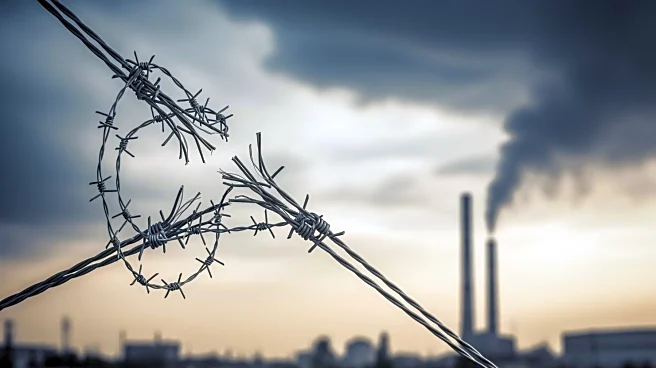What's Happening?
Ukrainian forces have reportedly launched attacks on Russia's Belgorod and Kursk Oblasts, resulting in significant power outages affecting over 20,000 residents. According to Belgorod Governor Vyacheslav Gladkov, the attacks involved multiple launch rocket
systems (MLRS) and led to widespread blackouts in Belgorod city and the village of Dubove. Debris from intercepted weapons reportedly struck a local thermal power plant, causing fires in several garages. Additionally, a Ukrainian strike set ablaze an electrical substation in Kursk Oblast's Korenevo community, further contributing to regional power outages. These areas are frequently used by Russia as staging grounds for military operations against Ukraine.
Why It's Important?
The attacks on Belgorod and Kursk Oblasts highlight the ongoing escalation in the conflict between Ukraine and Russia, particularly in terms of targeting critical infrastructure. The disruption of power supply in these regions underscores the vulnerability of civilian infrastructure amidst military operations. This development may exacerbate civilian hardships, especially as winter approaches, and could lead to increased tensions between the two nations. The attacks also reflect Ukraine's strategic response to Russia's intensified assaults on its own energy infrastructure, which have aimed to maximize civilian suffering by targeting power grids and heating systems.
What's Next?
As the conflict continues, further retaliatory actions from Ukraine against Russian infrastructure are possible, especially if Russia persists in targeting Ukraine's energy sector. The ongoing military exchanges may prompt international diplomatic efforts to de-escalate tensions and address the humanitarian impact on affected civilians. Additionally, both countries may seek to bolster their defenses and infrastructure resilience to mitigate the effects of future attacks.
Beyond the Headlines
The attacks on energy infrastructure in Belgorod and Kursk Oblasts may have broader implications for regional stability and international relations. The targeting of civilian infrastructure raises ethical concerns about the conduct of warfare and the protection of non-combatants. Long-term, these developments could influence global energy markets and geopolitical alliances, as countries reassess their positions and strategies in response to the evolving conflict.















